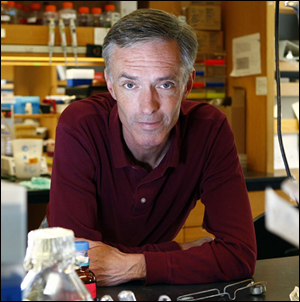James J. Collins will present his ground-breaking work in synthetic biology as guest speaker in the 2013-2014 John R. and Donna S. Hall Engineering Lecture Series. The Hall Lecture is part of a weeklong series of events commemorating 45 years of biomedical engineering education at Vanderbilt, and the 25th anniversary of the BME department.
The lecture – Life Redesigned: The Emergence of Synthetic Biology – is Wednesday, Oct. 23 at 3:10 p.m. in Vanderbilt’s Jacob’s Believed in Me Auditorium. A reception will follow. Live video of this event will be streamed on Vanderbilt News (at http://news.vanderbilt.edu). Archived video will be available for viewing after Oct. 25.

Collins is Howard Hughes Medical Institute investigator, a William F. Warren Distinguished Professor and professor of biomedical engineering at Boston University, where he is co-director of the Center for BioDynamics. Collins is a core founding faculty member of the Wyss Institute for Biologically Inspired Engineering at Harvard University.
“More than a decade ago, Collins, a decorated scientist at Boston University, helped give birth to synthetic biology, which soon grew into arguably the world’s hottest scientific discipline,” reported Paul Voosen in a 2013 profile of Collins that appeared in The Chronicle of Higher Education.
“Synthetic biology is bringing together engineers and biologists to design and construct biological circuits out of proteins, genes and other bits of DNA, and to use these circuits to rewire and reprogram organisms. These re-engineered organisms are going to change our lives in the coming years, leading to cheaper drugs, “green” means to fuel our car and clean our environment, and targeted therapies to attack superbugs and diseases such as cancer,” Collins said.
In his lecture, Collins will highlight recent efforts to create synthetic gene networks and programmable cells, and discuss a variety of synthetic biology applications in biocomputing, biotechnology and biomedicine.
Collins’ research group works in synthetic biology and systems biology, with a particular focus on using network biology approaches to study antibiotic action, bacterial defense mechanisms, and the emergence of resistance. His patented technologies have been licensed by over 25 biotech, pharma and medical devices companies. He has helped launch a number of companies, including Sample6 Technologies and EnBiotix.
Collins’ lab this year published work describing a gene-circuit “breadboard” to make E. coli more modular, making it easier to swap in genetic components than in the past. Future work involves engineering probiotics to fight cholera – supported by a recent grant from the Bill & Melinda Gates Foundation.
Collins is a Rhodes Scholar and the recipient of a MacArthur Fellowship. Other awards include an NIH Director’s Pioneer Award, a Sanofi-Institut Pasteur Award, as well as several teaching awards. He is a member of the National Academy of Engineering, the Institute of Medicine, and the American Academy of Arts & Sciences, and a charter fellow of the National Academy of Inventors.
Established in 2002, the John R. and Donna S. Hall Engineering Lecture Series allows Vanderbilt engineering students to hear renowned engineers from universities and agencies address engineering topics of particular interest.